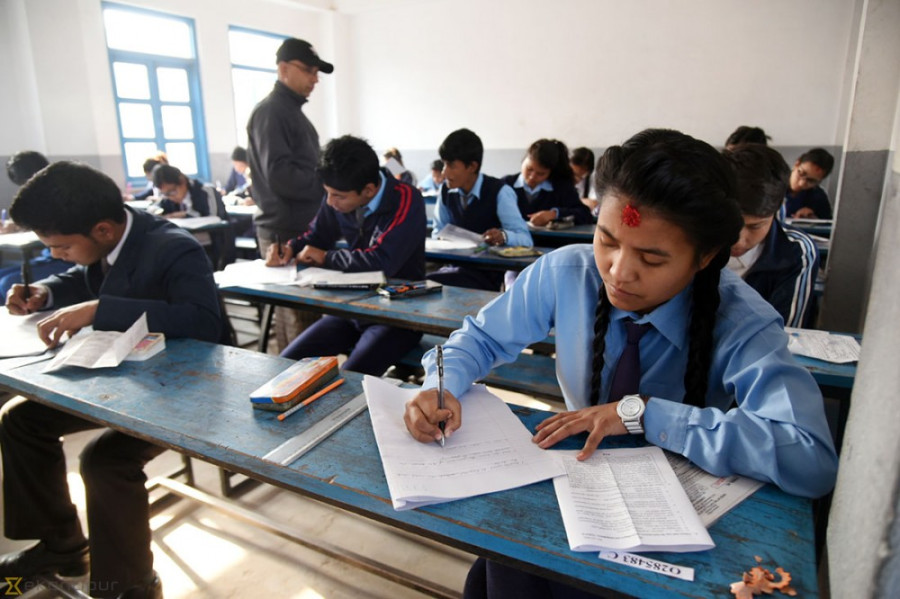National
SEE postponed, public gatherings of more than 25 barred, and gyms, film halls closed
The government’s decisions are aimed at limiting the spread of Covid-19, which has now invaded over 170 countries and killed more than 8,000 people.
Prithvi Man Shrestha
The government on Wednesday took a slew of decisions in an attempt to prevent the spread of the global Covid-19 outbreak which has invaded more than 170 countries so far.
The high-level coordination committee headed by Deputy Prime Minister and Defence Minister Ishwar Pokhrel decided to postpone the Secondary Education Examinations until further notice. The exams were scheduled to begin on Thursday.
“The high-level coordination committee led by Deputy Prime Minister Pokhrel decided to defer the Secondary Education Examinations,” Lokendra KC, a press advisor to Pokharel, told the Post.
Wednesday’s decision came hours after the Pokhrel-led committee banned all incoming passengers from Europe, the United Kingdom, the Gulf, West Asia, and Iran, among others, and close down all cinema halls, health clubs, and dance bars until April 30. The ban on entry of passengers starts from March 20 midnight and lasts till April 15, according to a statement of the high-level committee.
“Other decisions come into effect immediately,” Yogesh Bhattarai, minister for culture, tourism and civil aviation, told the Post over the phone. “These strong measures have been taken considering the worldwide impact of the coronavirus, the fear it has created, and the recommendations from different quarters.”
The government had already decided to close all schools, colleges and universities until April 12, but was pushing ahead with the SEE saying any delay could hamper the academic calendar, despite calls from parents to postpone the examinations.
A total of 482,219 students have registered for the examination.
The government, however, hasn’t decided on the new date for the exams, which were scheduled to conclude on March 30. The new academic calendar starts in mid-April.
Although Nepal has so far recorded only one Covid-19 case, Wednesday’s decisions, according to officials, are part of precautionary measures to prevent the spread of the disease.
Covid-19, a disease caused by a new strain of the coronavirus, now dubbed SARS-CoV-2, has so far killed over 8,000 and infected over 200,000 people across the world. The World Health Organization last week declared Covid-19 a pandemic.
The government has also barred more than 25 people from assembling for cultural, social and religious activities at party palaces, temples, monasteries, mosques, churches, and other religious and public spaces. It has urged the people to not go out unless necessary. Federal, provincial and local governments are all required to monitor compliances with these measures.
Earlier on Wednesday, former health minister and Nepali Congress lawmaker Gagan Thapa had called on the government to take more assertive action, including closing down public meeting spaces, saying that just asking members of the public to adopt social distancing would not be sufficient.
“The government should take measures that help reduce social mobility substantially,” Thapa said at a roundtable discussion organised by Kantipur, the Post’s sister paper. Thapa had registered a motion of urgent public importance at the House of Representatives regarding Covid 19 in early March.
“The government has announced a number of measures but there is a gap in the process,” said Thapa. “If one is suspected to be infected, they need to be brought to an isolation centre and precautions taken to ensure the safety of health workers and ambulance drivers who might come into contact with patients.”
Officials at the Ministry of Health and Population have admitted that they are facing difficulties when it comes to tracing the movement of people who might be infected with the virus.
Thapa also drew the attention of concerned officials to the unrestricted movement of Nepalis and Indians via the porous border. Currently, only four land crossing points between Nepal and India are operational.
Ram Chandra Tiwari, an information officer at the Department of Immigration, said that although Nepal has closed its doors to foreigners other than Indians through its border points, the cross-border movement of Nepali and Indian nationals has continued, as they do not need to go through any immigration procedure.
The government on Wednesday also decided to request the general public not to travel in crowds and has also asked transport entrepreneurs not to carry passengers beyond the seating capacity while instructing them to disinfect vehicles regularly. The high-level committee has also decided to take legal action against anybody who spreads misinformation about Covid-19.
Lawmaker Thapa stressed that the government should arrange for a single window to inform the public about the coronavirus and information should be shared on a daily basis, which could help discourage misinformation.
Public health experts at the Kantipur roundtable emphasised the need for reliable and up-to-date information at this crucial time.
“The government is talking with the telecom operators like Nepal Telecom and Ncell to disseminate messages via mobile ringtones,” said Sagar Dahal, chief of the Health Emergency Operation Centre at the Health Ministry. “Some technical matters need to be resolved.”
Binod Ghimire contributed reporting.




 13.12°C Kathmandu
13.12°C Kathmandu














